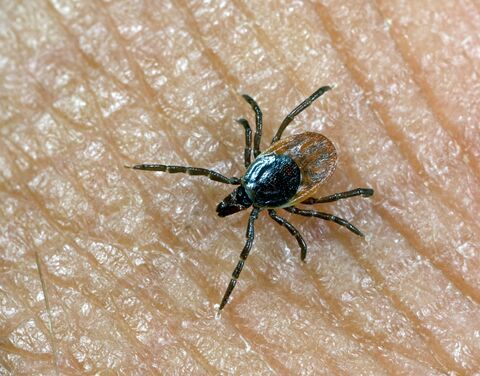
Each year between 1,000 and 2,000 tick bites are reported to AXA. Particular care should be taken from May to July, which is when two-thirds of all cases occur. However, the risk is reduced if a few precautionary measures are taken.
The spring and summer months are certainly lovely, but they also have their drawbacks. These include ticks – the small arachnids that lie in wait for us during pleasant strolls in the woods. Tick bites can result in illnesses such as Lyme disease (borreliosis) and a dangerous illness called tick-borne encephalitis (TBE). A vaccine against TBE is available. The Federal Office of Public Health recommends the vaccination for all adults and children over the age of six in Switzerland (apart from in the cantons of Geneva and Ticino).
There are large fluctuations in the number of cases of illness, both during a season and from one year to the next. In recent years, between 1,000 and 2,000 cases of illness connected with tick bites have been reported to AXA annually – around two-thirds of them between May and July. The weather is one reason for such large annual variations in reports of tick bites and consequent illness.
Depending on how the illness develops, treatment for a tick bite can cost anything between a few hundred and tens of thousands of Swiss francs. For people in employment, this is generally covered by mandatory accident insurance. Tick bites count as accidents for insurance purposes, just like spider bites and bee, wasp or hornet stings – mosquito bites, on the other hand, do not. "Legally, mosquito bites are too common to be described as an exceptional external factor, which is a required criterion for an accident," says Fabienne Montandon, Head of Accident Benefits, in explanation of the small but decisive difference.
It is also important to note that the health problems resulting from tick bites and insect bites or stings can be complex and unspecific, often making it difficult in practice to establish whether the problem was actually caused by a bite or sting. This may make long, complicated investigations necessary in individual cases. At any rate, when walking in the woods during spring and summer, it is vital to take precautions.
If you are bitten despite these precautions, the tick should be removed with tweezers or a special tick remover. Take care not to crush the tick or tug at it jerkily; instead, pull it out slowly and carefully. Most tick bites heal by themselves. However, it's important to keep an eye on the site of the bite. A doctor should be consulted if there is any inflammation or redness, and flu-like symptoms shortly after a bite are another warning sign. Accident insurance will cover the visit to the doctor and all the associated treatment costs.